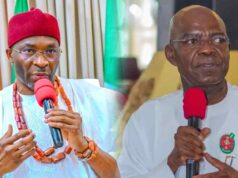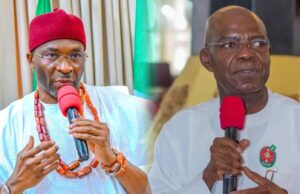The collapse in oil prices coupled with the COVID-19 pandemic is expected to plunge the Nigerian economy into a severe economic recession, the worst since the 1980s, the World Bank has predicted.
The Bank made the prediction in its latest Nigeria Development Update (NDU).
The report, “Nigeria In Times of COVID-19: Laying Foundations for a Strong Recovery,” released on Thursday, estimated that Nigeria’s economy would likely contract by 3.2 per cent in 2020.
This projection assumed that the spread of COVID-19 in Nigeria is contained by the third quarter of 2020.
If the spread of the virus becomes more severe, the economy could contract further.
“Before COVID-19, the Nigerian economy was expected to grow by 2.1 per cent in 2020, which means that the pandemic has led to a reduction in growth by more than five percentage points.
“The macroeconomic impact of the COVID-19 pandemic will likely be significant, even if Nigeria manages to contain the spread of the virus.
Read Also: Former Imo Governor, Ohakim Visits Sen Kalu
“Oil represents more than 80% of Nigeria’s exports, 30 per cent of its banking-sector credit, and 50 per cent of the overall government revenue. With the drop in oil prices, government revenues are expected to fall from an already low eight per cent of GDP in 2019 to a projected five per cent in 2020,” it stated.
According to the report, this comes at a time when fiscal resources are urgently needed to contain the COVID-19 outbreak and stimulate the economy.
It noted that the pandemic had also led to a fall in private investment due to greater uncertainty, and was expected to reduce remittances to Nigerian households, which in recent years had been larger than the combined amount of foreign direct investment and overseas development assistance.
“While the long-term economic impact of the global pandemic is uncertain, the effectiveness of the government’s response is important to determine the speed, quality, and sustainability of Nigeria’s economic recovery.
“Besides immediate efforts to contain the spread of COVID-19 and stimulate the economy, it will be even more urgent to address bottlenecks that hinder the productivity of the economy and job creation,” World Bank Country Director for Nigeria, Shubham Chaudhuri said.







![I’m No Longer Calling Governor Otti To Join APC — Deputy Speaker Kalu [Video] I'm No Longer Calling Governor Otti To Join APC — Deputy Speaker Kalu [Video]](https://abntv.com.ng/wp-content/uploads/2026/01/images-18-100x75.jpeg)

